Story Of India's First Nationalist Movement, Praja Parishad; Its emergence & birth of organizational structure
| 07-Jun-2021 |
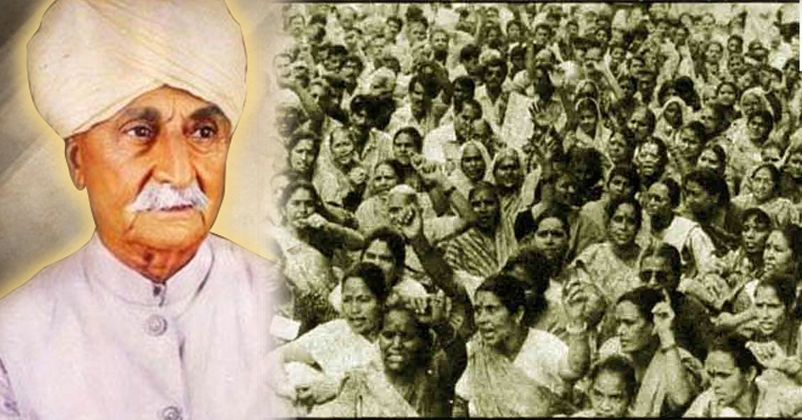
1. EMERGENCE OF PRAJA PARISHAD
(1) BIRTH OF PRAJA PARISHAD
Prior to accession of the state of J&K in 1947 with Indian Union, there was no major political party in Jammu unlike in the valley of Kashmir.
There were outfits like Naw Jawan Sabha, Muslim Conference, Hindu Sabha, Dogra Sadar Sabha and some others but their activities were confined to certain sections of communities. There were also some caste based Sabha of different Bradaries. However the RSS had developed a strong unit.
On the contrary in Kashmir (Jammu and Kashmir) the Muslim conference had built a strong movement against the Maharaja since 1931. A major faction of it led by Sheikh Mohammad Abdullah in 1938 divided the MC and renamed his outfit as J&K.National Conference to attain support of Sh. Jawaharlal Nehru and some others of the Congress against the Maharaja of the State. The National Conference could not have its mass base in Jammu areas but for its outlook and anti Dogra slogans symbolising the Maharaja as a whole Dogra community although it was a dynastic rule.
After painful communal division of India under a design the imperialists, created the theocratic State of Pakistan, its leadership not only staked claim on J&K because of its being Muslim majority but also launched a massive invasion with tribals supported by Pak- army which was by that time being controlled and commanded by the British Generals.
The Maharaja of the state, Hari Singh using his legal authority signed the Instrument of Accession with Indian union on October 26, 1947, and thus opted for secular India braving all pulls and pressures rather than yielding to theocratic Pakistan.
Under compelling circumstances the Maharaja handed over the reins of power to the political friend of Shri Nehru in Jammu and Kashmir, Sheikh Mohammad Abdullah, who pledged his loyalty to the Maharaja as the National Conference party had little base in Jammu and other regions of the State. Many time servers and opportunists thronged to the National Conference and to show their loyalties to the new ruler and indulged in several acts of sycophancy and even that of different kinds of degradation.
These people began chanting the slogans viz Aek Rehnama, Sheikh Mohd. Abdullah, Aek Tanzeem National Conference, Aek Jhanda, Halwala.
Thus, an intriguing situation was created. Sensing these trends of alone "one", Visionary Pt. Prem Nath Dogra and his colleagues felt that in a democracy such a form could prove despotic particularly in a State like of J&K.
Pandit Prem Nath Dogra and his admirers after due deliberations of three days, decided to float a new party under the name of the Praja Parishad. A young team of its activists was announced with Sh. Hari Wazir as its first President, Shri Hans Raj Pangotra General Secretary, other office bearers of this new party also included Sh. Sham Lal Sharma, Shri Durga Dass Verma, Shri Rajinder Singh, Shri Sahdev Singh, Shri Om Parkash Sangra, Sh. Roop Lal Rohmetra, Jagdish Raj Sahni, Mulkh Raj Arora, Hans Raj Ramnagar, Sh. Makhan Lal Aima, Jagdish Raj Khader Bhandar, Ishwar Dutt Shastri Magloor, Natha Singh, Dewarka Nath and others. Along with Pt. Ji, Shri Bhagwat Sawroop was named as Marg Darshik.
(1) BIRTH OF PRAJA PARISHAD
Prior to accession of the state of J&K in 1947 with Indian Union, there was no major political party in Jammu unlike in the valley of Kashmir.
There were outfits like Naw Jawan Sabha, Muslim Conference, Hindu Sabha, Dogra Sadar Sabha and some others but their activities were confined to certain sections of communities. There were also some caste based Sabha of different Bradaries. However the RSS had developed a strong unit.
On the contrary in Kashmir (Jammu and Kashmir) the Muslim conference had built a strong movement against the Maharaja since 1931. A major faction of it led by Sheikh Mohammad Abdullah in 1938 divided the MC and renamed his outfit as J&K.National Conference to attain support of Sh. Jawaharlal Nehru and some others of the Congress against the Maharaja of the State. The National Conference could not have its mass base in Jammu areas but for its outlook and anti Dogra slogans symbolising the Maharaja as a whole Dogra community although it was a dynastic rule.
After painful communal division of India under a design the imperialists, created the theocratic State of Pakistan, its leadership not only staked claim on J&K because of its being Muslim majority but also launched a massive invasion with tribals supported by Pak- army which was by that time being controlled and commanded by the British Generals.
The Maharaja of the state, Hari Singh using his legal authority signed the Instrument of Accession with Indian union on October 26, 1947, and thus opted for secular India braving all pulls and pressures rather than yielding to theocratic Pakistan.
Under compelling circumstances the Maharaja handed over the reins of power to the political friend of Shri Nehru in Jammu and Kashmir, Sheikh Mohammad Abdullah, who pledged his loyalty to the Maharaja as the National Conference party had little base in Jammu and other regions of the State. Many time servers and opportunists thronged to the National Conference and to show their loyalties to the new ruler and indulged in several acts of sycophancy and even that of different kinds of degradation.
These people began chanting the slogans viz Aek Rehnama, Sheikh Mohd. Abdullah, Aek Tanzeem National Conference, Aek Jhanda, Halwala.
Thus, an intriguing situation was created. Sensing these trends of alone "one", Visionary Pt. Prem Nath Dogra and his colleagues felt that in a democracy such a form could prove despotic particularly in a State like of J&K.
Pandit Prem Nath Dogra and his admirers after due deliberations of three days, decided to float a new party under the name of the Praja Parishad. A young team of its activists was announced with Sh. Hari Wazir as its first President, Shri Hans Raj Pangotra General Secretary, other office bearers of this new party also included Sh. Sham Lal Sharma, Shri Durga Dass Verma, Shri Rajinder Singh, Shri Sahdev Singh, Shri Om Parkash Sangra, Sh. Roop Lal Rohmetra, Jagdish Raj Sahni, Mulkh Raj Arora, Hans Raj Ramnagar, Sh. Makhan Lal Aima, Jagdish Raj Khader Bhandar, Ishwar Dutt Shastri Magloor, Natha Singh, Dewarka Nath and others. Along with Pt. Ji, Shri Bhagwat Sawroop was named as Marg Darshik.
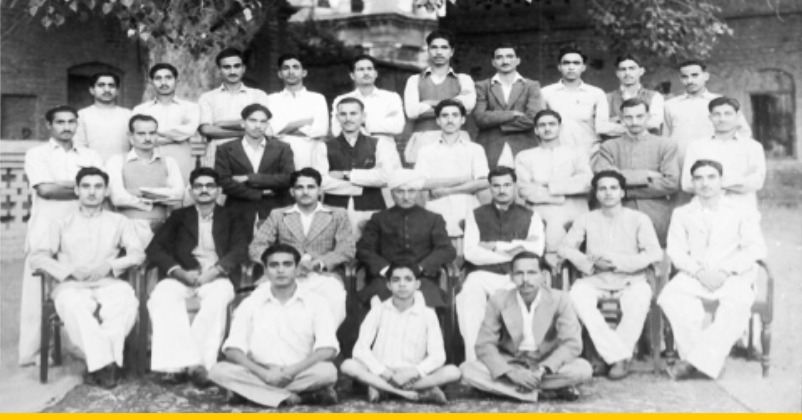
Pt. Prem Nath Dogra with Sham Lal Sharma, Bhagwat Saroop, Durga Dass verma and other activits.
THE RSS ROLE IN J&K
Prior to the birth of the Praja Parishad, the Rashtriya Sawayam Sangh had established its well knit units (Shakas) in most parts of the State, especially in the region of Jammu.
In late thirties(1939) while preparing for playing its important role in the movement for independence of India from the foreign yoke, adjoining J&K, the undivided Punjab like many other parts of country the RSS had come to be a hub of the patriotic activities.
Shri Madhav Rao Muley was the Prant Prachark, who departed some dedicated activists to establish RSS Shakhas in the State.
The first was to come Prof. Balraj Madhok in late thirties. But as he got the job of a Professor in a Srinagar college, Shri Jagdish Abrol of Sialkot, Shri Kedar Nath Sahani and some other Parcharks put in their great efforts to establish the RSS Shakhas at various places. The first one was established at Dewan Mandir in Jammu city.
Many local youths came forward to spread the RSS activities, mostly the games. These youths included Sh. Shayam Lal Sharma, Sh.Durga Dass Verma, Dr. Om Parkash Mengi & some others.
Sh. Abrol established his first karyalya at Ved Mandir in a room. Though large number of youth joined the RSS network but it was generally known as a body of children-teenagers.
In early forties, Sh. Mulley and some senior RSS men approached Pt. Prem Nath Dogra to lead the RSS in the State as Sangh Chalak to which he agreed and a big function was held in Jammu. Some high up of the RSS also Joined this samaroh.
With this taking over by Pt. Ji as Sanghchalak, the body attained significant respectability and fillipto its working.
Prior to the birth of the Praja Parishad, the Rashtriya Sawayam Sangh had established its well knit units (Shakas) in most parts of the State, especially in the region of Jammu.
In late thirties(1939) while preparing for playing its important role in the movement for independence of India from the foreign yoke, adjoining J&K, the undivided Punjab like many other parts of country the RSS had come to be a hub of the patriotic activities.
Shri Madhav Rao Muley was the Prant Prachark, who departed some dedicated activists to establish RSS Shakhas in the State.
The first was to come Prof. Balraj Madhok in late thirties. But as he got the job of a Professor in a Srinagar college, Shri Jagdish Abrol of Sialkot, Shri Kedar Nath Sahani and some other Parcharks put in their great efforts to establish the RSS Shakhas at various places. The first one was established at Dewan Mandir in Jammu city.
Many local youths came forward to spread the RSS activities, mostly the games. These youths included Sh. Shayam Lal Sharma, Sh.Durga Dass Verma, Dr. Om Parkash Mengi & some others.
Sh. Abrol established his first karyalya at Ved Mandir in a room. Though large number of youth joined the RSS network but it was generally known as a body of children-teenagers.
In early forties, Sh. Mulley and some senior RSS men approached Pt. Prem Nath Dogra to lead the RSS in the State as Sangh Chalak to which he agreed and a big function was held in Jammu. Some high up of the RSS also Joined this samaroh.
With this taking over by Pt. Ji as Sanghchalak, the body attained significant respectability and fillipto its working.
(I) ORGANISATIONAL STRUCTURE OF PRAJA PARISHAD
(A) DIVIDED OPINION
When in 1947, it was decided to float a political body, some senior activists were of the opinion that the new party should be named as Jammu Praja Parishad and its manifesto be titled as Naya Jammu. This would be an answer to the Kashmir National Conference and that too the Naya Kashmir. But some others were of the view that party should not look as confined to just one region alone and also should not sound as reactionary.
Because of differences over the name some top leaders of RSS when advised that new party should be named as All Jammu & Kashmir Praja Parishad because the legal authority, the Maharaja, had signed the Instrument of Accession for his entire State. And more so it should not subscribe to the philosophy of any communal decision as Pakistan had come to be a theocratic State. Hence, the new party was named as the All Jammu and Kashmir Praja Parishad and Tri-colour its flag, with following objectives:
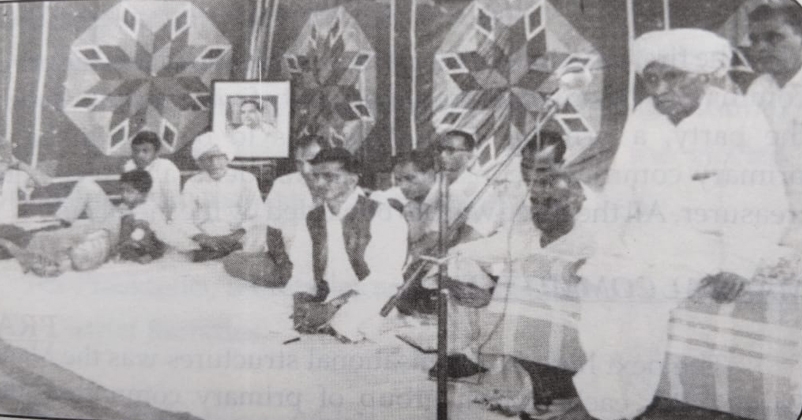
PT. DOGRA IN A MEETING
(B) OBJECTIVES OF THE PARTY
The main objectives of the party were "to achieve full integration of Jammu & Kashmir State with the rest of India like other acceding states and to safeguard the legitimate democratic rights of the people of Jammu from anti-Dogra govt. of Sheikh Mohammad Abdullah.
The Praja Parishad held that Jammu and Kashmir is an inseparable and indivisible part of India, and based on Indian culture, the party would establish such a Political, social, and economic order in which there would be no discrimination on account of caste, colour and faith. All the citizen would be provided equal opportunities for progress.
The main objectives of the party were "to achieve full integration of Jammu & Kashmir State with the rest of India like other acceding states and to safeguard the legitimate democratic rights of the people of Jammu from anti-Dogra govt. of Sheikh Mohammad Abdullah.
The Praja Parishad held that Jammu and Kashmir is an inseparable and indivisible part of India, and based on Indian culture, the party would establish such a Political, social, and economic order in which there would be no discrimination on account of caste, colour and faith. All the citizen would be provided equal opportunities for progress.
(C) CONSTITUTION OF PRAJA PARISHAD
Any resident of Jammu and Kashmir of 18 years and above age who endorsed the aims and objectives of the party could become its member. He continued to be its member as long as he regularly paid its annual membership fee that was four Annas unless he resigned, removed from the membership or secured the membership of any other political party.
PRIMARY SAMITI (COMMITTEE):
The first structure in the party organisations was the primary committee. Wherever there were twenty five or more members of the party, a primary committee was to be constituted. The primary committee consisted of a president, a secretary and a treasurer. All the three were to be elected by the members.
MANDAL COMMITTEE:
The next higher organisational structures was the Mandal Samiti. For each sixteen group of primary committees there would be a Mandal committee. All the members of primary committee were to elect the president of the Mandal and he himself to constitute his executive consisting of a secretary, a treasurer and six members.
The Mandal committee under its jurisdiction would be responsible for the execution of the policies and programme of the party.
TEHSIL COMMITTEE:
The Next higher structure would be the Tehsil Committee. All the members of the executive of the Mandals in a Tehsil would jointly constitute a Tehsil committee. They would elect a President, at least two vice- Presidents, a treasurer and nine members of the executive of Tehsil Samiti. They, with the consent of President of Tehsil committee, would also elect two representatives for general council as well as organisational secretary. The organisational secretary in co operation with the secretary of Tehsil committee would be responsible for the functioning as well as popularising the ideology of the party in that Tehsil.
GENERAL COUNCIL:
The constitution of general council is an under
(a) The Presidents, the secretaries and organisational secretaries of all the Tehsil Samities as well as the elected representatives from each party constituency.
(b) The Presidents, secretaries and organisational secretaries of all the District Samities.
(c) Those institutions which combined with the Praja Parishad whose five members would be elected by the President on the order of those institutions.
(d) It would be the right of the President of Jammu and Kashmir Praja Parishad to nominate five members of Praja Parishad.
Each member of the General council would have to pay 5 Rupees annually. It would be the main committee to run the policies and functions of Praja Parishad. During tenure it would have a right to solve all the problems which used to come in its way. It would be allowed to issue orders to other committees from time to time. The session of the General council was to be held once in a year.
CENTRAL SAMITI:
At the apex of the party hierarchy there would be central samiti comprising of 21 members including President. These members would be nominated by President from the members of the General council. The President of the central committee would also nominate two vice presidents, one secretary and one treasurer. Central committee would be responsible to General Council for its action, orders regarding the questions which were not defined in the party constitution. It worked to fulfil the aims of Praja Parishad.
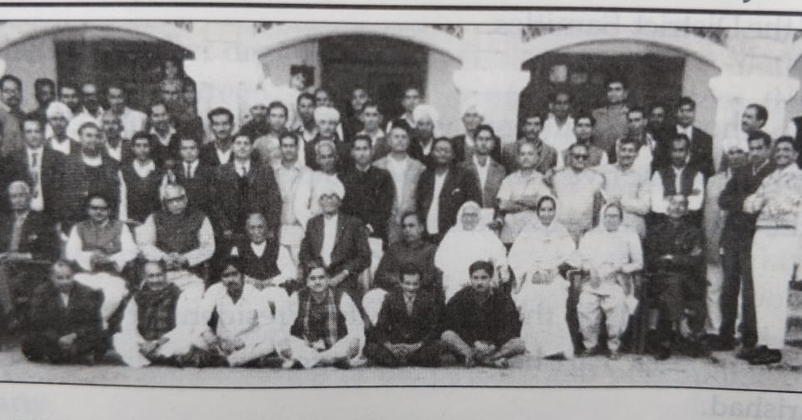
Pt. Prem Nath Dogra with Executive Members of Praja Parishad at his Residence Kachi Chawni Jammu
(D) PRESIDENT OF THE PARTY
In the higher structure of the organisation of the party there was President. The President would have the highest authority. The General Secretary of the party would invite nominations for the candidate desirous to contest for Presidentship from the Tehsil and District working committees of the party. The nominations were to be submitted within a fixed time. After receiving the nominations if any candidate desired to withdraw could do so. On the fixed date the General Secretary would announce the names of the persons who would finally remain in the fray. He then would issue ballot papers to each member of the General council to vote in favour of the nominated candidate he liked. After receiving the ballots papers duly filled, the General Secretary would open them in the presence of all members of General body at an appointed date. The candidate with majority votes would be declared as the president of the unity.
(E) Party Finance
The Finances of the party comprised of the money collected in the form of membership fee of four Anna's as well as five rupees collected from each member of the General council. As the amount was insufficient to meet the day to day expenses of the party, donations from different individuals were also accepted. In order to finance the different movements launched by the party from time to time, the party got printed tickets of Rs.1, Rs.5, Rs.10, Rs. 20, Rs.50, Rs.100 with the photograph of its president Pt. Prem Nath Dogra and sold amongst the people. There were rumours that the then Maharaja of Kashmir was also contributing to the party funds. The press tried to confirm this fact from the top party leaders still alive however, most of these leaders denied such charges.
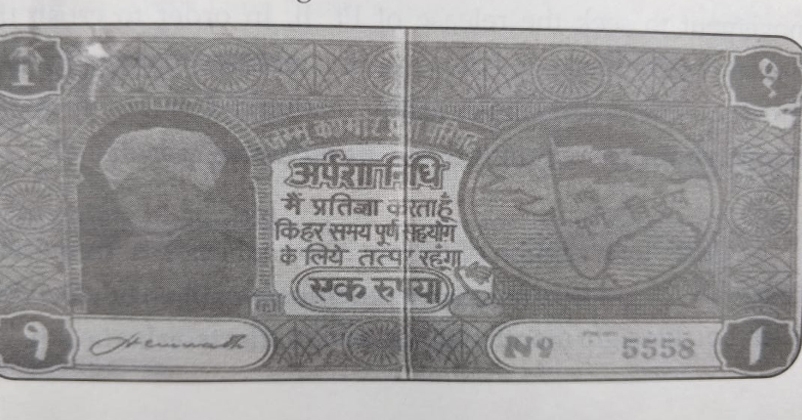
This very much irked the Sheikh as he was already intolerant towards his adversaries. Several important activists of RSS and other small organisations were expelled from the State. They also included Prof.Balraj Madhok, Shri Jagdish Abrol, Shri Kidar Nath Sahni, Kavi Raj, Vishnu Gupat and others.
Pt. Prem Nath Dogra and some of his colleagues were arrested and detained. Pt Ji was shifted to Srinagar in intense cold conditions of the month of Feb.1949. He was put under detention by slapping section 3 of the RPC which was notoriously known as "Daffa Tun", which meant to put in lockup without any trial.
He was dubbed as anti Muslim in 1947, but Ironically in 1932, when Pt. Dogra was prematurely retired from the service was charged as being mild towards Muslim Conference agitators as Wazir Wazarat (DC) at Muzafarabad District of the State. The arrest and detention of Pt. Ji by the Sheikh Govt. resulted in great resentment, as this Govt, was indulging in many other acts of omission and commission.
In May, 1949, the Praja Parishad launched a Satyagrah movement to seek the release of Pt. Ji. In order to crush this movement the Sheikh led dispensation resorted to many kinds of atrocities. This caused anger against National Conference and its fellow supporters within and outside the state.
After intervention of certain National leaders from Delhi centre, Pt. Dogra was released from Srinagar jail on 8th October, 1949, but this eight months jail had severe effects on his health.
Pt. Prem Nath Dogra and some of his colleagues were arrested and detained. Pt Ji was shifted to Srinagar in intense cold conditions of the month of Feb.1949. He was put under detention by slapping section 3 of the RPC which was notoriously known as "Daffa Tun", which meant to put in lockup without any trial.
He was dubbed as anti Muslim in 1947, but Ironically in 1932, when Pt. Dogra was prematurely retired from the service was charged as being mild towards Muslim Conference agitators as Wazir Wazarat (DC) at Muzafarabad District of the State. The arrest and detention of Pt. Ji by the Sheikh Govt. resulted in great resentment, as this Govt, was indulging in many other acts of omission and commission.
In May, 1949, the Praja Parishad launched a Satyagrah movement to seek the release of Pt. Ji. In order to crush this movement the Sheikh led dispensation resorted to many kinds of atrocities. This caused anger against National Conference and its fellow supporters within and outside the state.
After intervention of certain National leaders from Delhi centre, Pt. Dogra was released from Srinagar jail on 8th October, 1949, but this eight months jail had severe effects on his health.
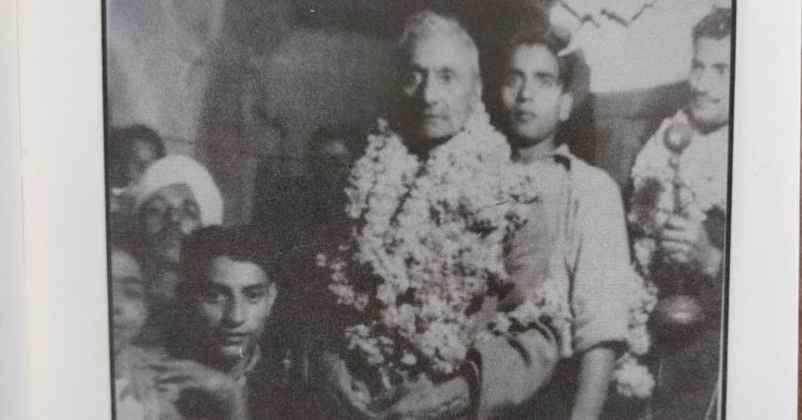
Pt. Prem Nath Dogra released from Srinagar Jail in 1949
In this movement several Satyagrahis were tortured to the extent that they were incapacitated even to the extent of being hard of hearing and other ill-effects throughout their lives. They also included one Shri Dina Nath of Jammu and also Shri Chuni Lal Pandoh of Reasi.
But all this provided a big impetus to the Praja Parishad and its role became all the more important when the Sheikh govt. took some unhealthy decisions under communal and parochial considerations.
But all this provided a big impetus to the Praja Parishad and its role became all the more important when the Sheikh govt. took some unhealthy decisions under communal and parochial considerations.
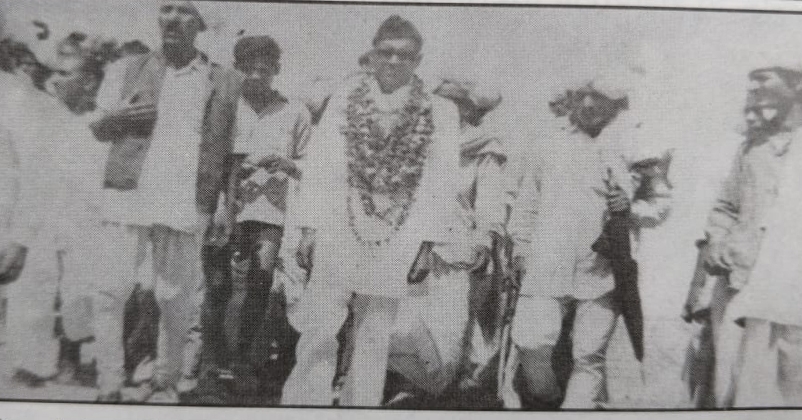
Th. Seh Dev Singh with other activists
After his release from Jail Praja Parishad announced Pt. Prem Nath Dogra as its President, Shri Durga Dass Verma its General secretary, Dhanvantar Singh, Zaildar Ranjit Singh Nagri Parol, Luder Manni sangra Koota, Sh. Sham Lal Sharma Vice Presidents, Sec (Org.), Sh. Bhagwat Swaroop & Gopal Dass Sachar Incharge publicity matters,Makhan Lal Aima, Parbhari (out side the State), Ram Nath Balgotra incharge Kathua District, Radha Krishan Sharma Udhampur District and Roop Lal Rhometra Doda District. The member of the working Committee were announced as Chatru Ram Dogra, Shiv Ram Gupta, Sant Ram Baru, Gian Chand Mirpuri, Jagat Ram Aryan, Luder Mani Sangra, Zaildar Ranjeet Raghunath Singh Samyal & Jagdish Khader Bhandari.
THE FOLLOWING WERE ANNOUNCED AS ORGANIZING SECRETARIES:
Sh. Natha Singh (Ramban), Shiv Kumar Sharma(Kishtwar), Baldev Raj (Bhaderwah), Mulkh Raj Arora(Udhampur), Rishi Kumar Koushal (Reasi), Hans Raj Gupta (Ramanagar), Rajinder Singh & Shadi Lal Sharma (Jammu), Som Nath Dogra(Akhnoor), Thakur Seh Dev Singh (Nowshera), Jagdish Chander Shastri(Rajouri), Narsingh Dass Sharma (Samba), Dawarka Nath (Basholi), Ishwar Dass Shastri(Hiranagar), Swaran Dev Singh (Billawar), Jagdish Singh (Kathua), Ved Parkash & Yash Bhasin (R.S.Pura)
THE FOLLOWING WERE ANNOUNCED AS ORGANIZING SECRETARIES:
Sh. Natha Singh (Ramban), Shiv Kumar Sharma(Kishtwar), Baldev Raj (Bhaderwah), Mulkh Raj Arora(Udhampur), Rishi Kumar Koushal (Reasi), Hans Raj Gupta (Ramanagar), Rajinder Singh & Shadi Lal Sharma (Jammu), Som Nath Dogra(Akhnoor), Thakur Seh Dev Singh (Nowshera), Jagdish Chander Shastri(Rajouri), Narsingh Dass Sharma (Samba), Dawarka Nath (Basholi), Ishwar Dass Shastri(Hiranagar), Swaran Dev Singh (Billawar), Jagdish Singh (Kathua), Ved Parkash & Yash Bhasin (R.S.Pura)
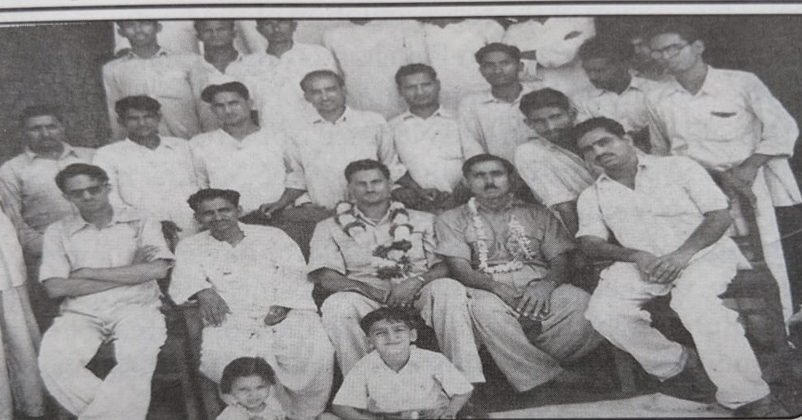
Sh. Durga Dass Verma Gen. Sec. with other activists
PT.DOGRA POST RELEASE:
After his release from detention of 8 long months in Srinagar jail, Pt. Prem Nath Dogra lost no time and took stock of the fast taking developments within the State as also at the National and International level viz a viz Kashmir after due consultations with the local activists and the leaders of the patriotic outlook at the national level,it was decided to build a strong net work of the Praja Parishad up to the village level.
The dedicated workers did a yeoman's job in establishing party units at various levels. After accomplishing the task of organising the PP units at the various levels, there was unanimous opinion that Pt. Ji should himself head the Party.
NOVEMBER 10, 1951
A State level convention was convened. In his first Presidential address, Pt. Dogra listed a detailed account of the happenings and dangers looming large ahead.
Pt. Dogra made is maiden address as President of Praja Parishad at a big convention held at Jammu on November 10, 1951.
After his release from detention of 8 long months in Srinagar jail, Pt. Prem Nath Dogra lost no time and took stock of the fast taking developments within the State as also at the National and International level viz a viz Kashmir after due consultations with the local activists and the leaders of the patriotic outlook at the national level,it was decided to build a strong net work of the Praja Parishad up to the village level.
The dedicated workers did a yeoman's job in establishing party units at various levels. After accomplishing the task of organising the PP units at the various levels, there was unanimous opinion that Pt. Ji should himself head the Party.
NOVEMBER 10, 1951
A State level convention was convened. In his first Presidential address, Pt. Dogra listed a detailed account of the happenings and dangers looming large ahead.
Pt. Dogra made is maiden address as President of Praja Parishad at a big convention held at Jammu on November 10, 1951.
In his forty minute speech Pt. Ji pointed out the delegates that: This session of the representation of the people is being held at a crucial juncture when Pakistan is out to grab the entire State of J&K with the strength and support of Anglo-America bloc and on the other the Sheikh Led National Conference Govt. is playing dubious. Apparently the division of the State is being opposed but little is being done to get liberated the enemy held areas although lakhs of people of these places have been forced out to become refugees. More over it is being designed to have a constitution which would be on the lines of party bible of Naya Kashmir in accordance with their slogan of Quit Kashmir.
Referring to the grave situation created by the massive enemy invasion of the State Pt. Ji in his address paid rich tributes to great martyr Brigadier Rajinder Singh, the Chief of staff of the State Units and recalled that how with just about a company of the State Army, checked the advances of thousands of invaders for three days to enter in the Valley of Kashmir and fought with the enemy till last bullet and last drop of his blood as per order of the Maharaja. This had provided opportunity to Maharaja Hari Singh to sign the instrument of Accession with Indian Union on October 26, 1947 and the next day on October 27, the Indian troops landed at Srinagar to push back the invaders.
Pt. Dogra in his address also mentioned the great valour demonstrated by Lt. Col. Hira Nand Dubey, Maj. Angrez Singh, Lt. Amlok Singh, Martyr Captain Sardar Ganga Singh and others on various fronts in fighting the enemy despite treachery by some army men under communal in fluence.
Referring to the grave situation created by the massive enemy invasion of the State Pt. Ji in his address paid rich tributes to great martyr Brigadier Rajinder Singh, the Chief of staff of the State Units and recalled that how with just about a company of the State Army, checked the advances of thousands of invaders for three days to enter in the Valley of Kashmir and fought with the enemy till last bullet and last drop of his blood as per order of the Maharaja. This had provided opportunity to Maharaja Hari Singh to sign the instrument of Accession with Indian Union on October 26, 1947 and the next day on October 27, the Indian troops landed at Srinagar to push back the invaders.
Pt. Dogra in his address also mentioned the great valour demonstrated by Lt. Col. Hira Nand Dubey, Maj. Angrez Singh, Lt. Amlok Singh, Martyr Captain Sardar Ganga Singh and others on various fronts in fighting the enemy despite treachery by some army men under communal in fluence.
Pt. Prem Nath Dogra at Praja Parishad Convention in 1951
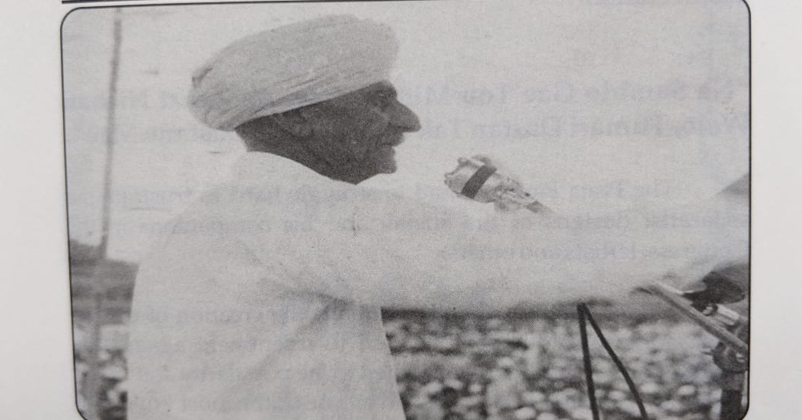

In this address the plight of the migrants from enemy held areas was also listed.
Detailing the highly sad situation being created by the internal and external elements, Pt. Ji reminded the delegates and also the common people that all of them owe a special responsibility to save this State for India as this huge State J&K was built by their ancestors with their blood, flesh and bones.
He opposed the controversial moves and slogans to distance the State from rest of India and working for having a separate constitution. In the situation, Pt. Ji observed that "there seems a dire need for a struggle for which we all should prepare for a great cause."
He opposed the controversial moves and slogans to distance the State from rest of India and working for having a separate constitution. In the situation, Pt. Ji observed that "there seems a dire need for a struggle for which we all should prepare for a great cause."
PT. JI CONCLUDED HIS SPEECH WITH A WARNING:
"Na Samblo Gae Tou Mit Jao Gae, Ae Zanat Nishan Walo, Tumari Dastan Tak Bhi Na Hogi Dastano Mae".
The Praja Parishad had to struggle hard to frustrate the separatist designs of the Sheikh and his companions in the Congress, leftists and others.
Under communal considerations the creation of district Doda and many other wrongs led to resentment against the Sheikh Govt. which also contributed to the popularity and rise of the Praja Parishad. Praja Parishad as one of the most important National Parties of the Jammu & Kashmir opposed the setting up of a separate Constituent Assembly for the State. It favoured the application of Union Constitution to Jammu & Kashmir by a single stoke. But due to the peculiar conditions in the State in a special session of party working committee held on 8th May 1951 decided to contest the elections.
All ill conceived moves of Sheikh Administration coupled with large scale rejections of nomination papers of the Praja Parishad Candidate for the Constituent Assembly compelled the party to boycott the elections. And thus a stage was set for a long drawn struggle.
"Na Samblo Gae Tou Mit Jao Gae, Ae Zanat Nishan Walo, Tumari Dastan Tak Bhi Na Hogi Dastano Mae".
The Praja Parishad had to struggle hard to frustrate the separatist designs of the Sheikh and his companions in the Congress, leftists and others.
Under communal considerations the creation of district Doda and many other wrongs led to resentment against the Sheikh Govt. which also contributed to the popularity and rise of the Praja Parishad. Praja Parishad as one of the most important National Parties of the Jammu & Kashmir opposed the setting up of a separate Constituent Assembly for the State. It favoured the application of Union Constitution to Jammu & Kashmir by a single stoke. But due to the peculiar conditions in the State in a special session of party working committee held on 8th May 1951 decided to contest the elections.
All ill conceived moves of Sheikh Administration coupled with large scale rejections of nomination papers of the Praja Parishad Candidate for the Constituent Assembly compelled the party to boycott the elections. And thus a stage was set for a long drawn struggle.